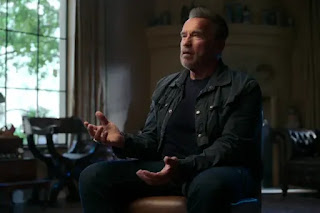Arnold Schwarzenegger has fully embraced Netflix, starting with FUBAR, an exciting action-comedy series in which the former Terminator portrays an aging CIA operative embarking on a final mission with his daughter. Now, we have "Arnold," a captivating three-part docuseries directed by Lesley Chilcott, delving into the life of the 75-year-old icon from an Austrian bodybuilder to a Hollywood legend and California governor. The film features appearances by Schwarzenegger's friends, including director James Cameron, co-stars Danny DeVito and Jamie Lee Curtis, and even his '80s rival Sylvester Stallone.
At the beginning of "Arnold," one of Schwarzenegger's friends remarks, "He's the most fiercely competitive person I've ever met." It is this relentless drive, coupled with his admission of using steroids, that propelled Schwarzenegger to the pinnacle of success in Hollywood. The docuseries, which spans approximately three hours, shares entertaining anecdotes, such as film producer Mike Medavoy's initial desire to cast O.J. Simpson as the Terminator and Schwarzenegger as the rebel soldier Kyle Reese in "The Terminator." However, during a meeting with Cameron, the director became convinced that Schwarzenegger, with his imposing physique as a former Mr. Universe, would be perfect for the role of the time-traveling assassin.
Schwarzenegger also reveals a fun anecdote about his desire to alter the iconic Terminator line to "I will be back" to make it sound more robotic. However, Cameron shut down the suggestion with a blunt response, saying, "Are you the writer? Well, then don't tell me how to fucking write."
One of the most entertaining sections of the docuseries explores the heated rivalry between '80s action stars Schwarzenegger and Stallone. Schwarzenegger admits, "I always need an enemy," and adds, "Every time he came out with a movie, like 'Rambo II,' I had to figure out a way to outdo it," referring to his own film, "Commando." Stallone compares their rivalry to the famous boxing matches between Ali and Frazier, acknowledging that he was often the underdog and constantly faced defeat, while Schwarzenegger emerged from his cinematic endeavors relatively unscathed. Stallone recalls the intense animosity, stating, "We were incredibly antagonistic. We couldn't even stand to be in the same room. People had to separate us."
After achieving success in the entertainment industry, Schwarzenegger made a surprising move into politics, running as a Republican in a recall election for the governorship of California. His decision was deemed "absurd" and "ridiculous" by his friend DeVito, a lifelong liberal, as revealed in the documentary.
Just days before the election, the Los Angeles Times published an investigative story featuring accusations from six women claiming that Schwarzenegger had groped and humiliated them. The documentary sheds light on the story's background, with reporter Carla Hall explaining how the LA Times had been investigating rumors for years, but it took time to fully verify the claims. Schwarzenegger vehemently denied the allegations, attacking the media and asserting that the reports were fabricated.
Ultimately, a total of 15 women came forward to accuse Schwarzenegger of misconduct spanning three decades. In "Arnold," Schwarzenegger offers a more substantial apology for his actions, acknowledging that his initial reaction was defensive and now recognizing that his behavior was unequivocally wrong.
Surprisingly, the scandal did not significantly impact Schwarzenegger's chances in the election, and he emerged victorious. Hall expresses her surprise at the lack of effect on the polls and her expectation that more people would
have been offended.
While the docuseries does not provide an in-depth assessment of Schwarzenegger's time as California governor, it does address another major controversy in his personal life—the revelation that he fathered a son, Joseph, with his Guatemalan maid, Mildred Patricia Baena. This revelation led to the end of his marriage with Maria Shriver. Joseph appears in the docuseries, working out alongside his father.
Schwarzenegger reflects on the impact of his actions, admitting the pain he caused his family and describing it as a major failure. He expresses reluctance to discuss the matter, as it reopens old wounds, but acknowledges that he must live with the consequences for the rest of his life. However, he also emphasizes his love for Joseph and his pride in seeing him grow into an extraordinary young man. Despite his mistakes, Schwarzenegger emphasizes that Joseph is welcome in his life and that he and his ex-wife raised their children well, providing a positive outcome in the midst of this sad story.





![[Music] Hypeman Deejay_Samklef x DJ Kiky - Birthday Mixtape (Celebrity Bouncer) Shapiro Vol. 2](https://blogger.googleusercontent.com/img/b/R29vZ2xl/AVvXsEizlGDjhhsaDBLwKUmVw9RMtTTa5Q9jVjErhH00J6JIE5HpP2TRAQEeo-Z7b5Lx56hfKe-DVTLBXkhgPagc4T44c9dn6ARLSLc3P0JNnE5p4TX-vIxD0uCln9q2qZXwklGnlkYc7pMgTgdIWhoNbdw9Y9xCZwSuFc5pf9jy8UPwThPQXV37aMC7UA/w72-h72-p-k-no-nu/IMG-20240424-WA0019.jpg)










0 Comments